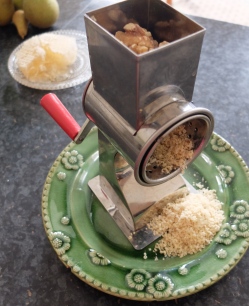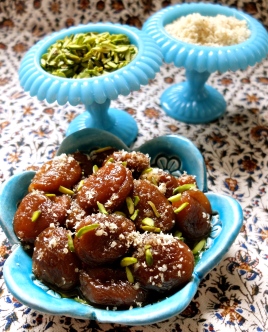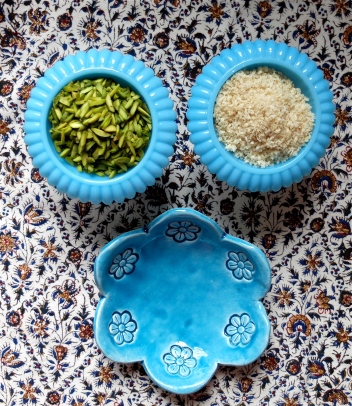شاد باشید که جشن مهرگان آمد بانگ و آوای ِدَرای ِکاروان آمد
Be happy Mehregan celebrations are here Call & song of caravan bells are here
Both poems in this blog are by Manuchehri Damghani, an 11th century Irani poet.
In Iran the equinoxes herald the seasons. The autumn equinox was on Wednesday 23rd of September for us in the northern hemisphere, and is known as Mehregan in Iran. Quite a different story for my sister in the antipodes!
Several of us Persian food bloggers from around the globe have been getting together over the past few years and posting seasonal stories and recipes to observe the changing seasons. At the bottom of this post you’ll find a link to all their recipes.
Mehregan celebrations are dedicated to the god of love and kindness. It is also the first day of the Iranian month of Mehr (by the way, mehr means kindness), traditionally the first day of school. It is said that at this time of harvest and plenty, people got together to eat, drink and recite poetry.
I can’t imagine a better reason to hold a celebration. I once read somewhere that kindness begets kindness: that is, if someone experiences an unexpected kindness, they in turn behave kindly, and so it goes on. I shan’t go into the complex theory of evolution and altruism here, but isn’t it fascinating to think that kind traits, not selfish genes alone, increase chances of survival?
Of all the seasons, I think autumn is the one where I am most conscious of the change, both at home and on my plot. At home, I change my wardrobe, getting out boots and putting away sandals. On my allotment, I collect the fallen leaves and incorporate them into my soil : the rotting leaves help make soil heavy with clay a little more friable. This soil, though bare now, is recuperating for the next season’s growth.
خیزید و خز آرید که هنگام خزان است
باد خنک از جانب خوارزم وزان است
آن برگ رزان بین که بر آن شاخ رزان است
گویی به مثل پیرهن رنگرزان است
دهقان به تعجب سرانگشت گزان است
کاندر چمن و باغ نه گل ماند و نه گلنار
ابونجم احمد ابن احمد ابن قوص منوچهری دامغانی
Get up and bring furs as it is the time of autumn
A chill wind blows from Khawrazm
Look at the vines with grapes on their branches
They are like the shirts of dyers
The peasant bites his finger in surprise
For in the grass & garden neither flowers nor blossoms remain
Here is a a simple sweet dish which mum used to make for us to enjoy as a pudding or snack. I hope you find it as warming and comforting as we do.
Geysava Warm syrupy apricots گیساوا
(Serves four: recipe is gluten free and, without dairy, is vegan & dairy free)
- 250g of organic (caramely) apricots – bright orange dried apricots are treated with sulphur dioxide to preserve their colour.
- A pinch of salt
- Earl Grey tea or water
- 1 tbsp local mild honey (approx 20g)
- 1 tbsp butter (approx 20g)
- 1 tbsp of nuts, either toasted walnut or chopped pistachios (opt)
- 1 tablespoon of (1 o 1 style) Iranian mild rosewater or a small drop of vanilla paste
Serve with clotted cream, ice-cream or vanilla yoghurt.
Pour enough water or mild earl grey tea to cover the apricots by 1 cm, and soak overnight. Prepare your nuts (if using). If you like them crunchy, toast the nuts then chop into smallish pieces. On the other hand, if you like them soft I find grating the walnuts makes them fluffy.


In the morning, check there isn’t any grit or soil in the bottom of the dish, then pour it into a cooking pot with the soaking liquor to cover. If there isn’t enough, add more water. Add a pinch of salt, and put them on a high heat to come to simmer. Simmer for 15 mins or until they are soft but are not falling apart.
From here on, it is up to you : if you’d like to eat them as they are, then do so with a sprinkle of nuts to add another texture and make them even more nutritious.
Otherwise, off the heat, stir in the honey and butter. If you do add butter, make sure you serve them warm as the butter resolidifies and looks dull. If you don’t add butter, then you can serve it hot, warm or cold. Similarly you can add the rosewater or vanilla stir, taste and adjust as you please.
My mother would make it simply with our own sun dried apricots and walnuts from Osku.
Apricots are said to have originated in the caucasus mountains (so local to where I originate!). The latin name is prunus armeniaca (armenian plum). As with other stoned fruit, it is technically a drupe, like peaches,blackberries, olives, black pepper and coconuts, to name a few. Finally, a lot of almond liqueurs are flavoured with apricot kernels.
Noushe jan نوش جان
With special thanks to Sarvnaz Paknia for finding suitable poems & Salehe Salehpour-Oskoui aka mum for helping with the translation.




